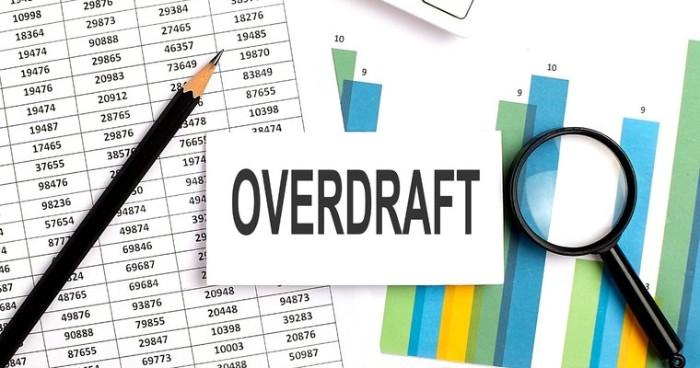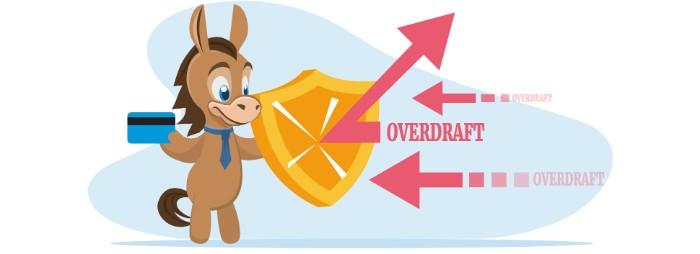Advertisement

Rick Novak Nov 30, 2024
What is Form 2441: A Definition of Child and Dependent Care Expenses
54555

Kelly Walker Dec 11, 2024
Are Personal Loans Considered Income?
41646

Kelly Walker Oct 22, 2024
Top Alternatives to Zillow and Trulia
71563

Kelly Walker Jan 18, 2025
Credit Cards: How Many Should You Have
98337
Advertisement
What Is Overdraft Protection?
Nov 14, 2024 By Kelly Walker
In this blog post, we will be discussing what exactly Overdraft Protection is and why it's beneficial for handling your money in a secure way. So, if you want to learn more about this practical financial management system, don't miss out! Keep reading to find out all about Overdraft Protection.
What is Overdraft Protection and How Does It Work
Overdraft protection is a service offered by financial institutions that allow customers to overdraw their checking accounts up to a certain limit. This gives customers the option of spending more than they have in their account but will result in an overdraft fee if the balance goes below zero.
When you sign up for overdraft protection, the bank will transfer money from another account, such as a savings account or a line of credit, to cover the overdraft. This ensures that you will have enough money in your checking account to pay for necessary transactions even if there is not enough in the balance.
It also prevents any additional fees and negative marks on your credit score that may come with having an overdrawn account. The overdraft protection offered by financial institutions is a useful service, but it should not be used as a crutch to spend more than you can afford. It's important to keep track of your spending and budget accordingly to ensure that you have enough money in your accounts each month.
If you find yourself relying on overdraft protection too often, it may be time to reassess your spending habits and find ways to cut back. Overdraft protection can save you from incurring additional fees in the event of an overdraft, but it shouldn’t become a habit.
Benefits of Enabling Overdraft Protection

Enabling overdraft protection is a great way to protect yourself from costly fees and potential negative marks on your credit score. It also provides an extra layer of security by allowing you access to money even if you don't have enough in the account. This can be especially beneficial if you are going through a financial emergency but don't have enough money in the balance to cover it.
Overdraft protection can also help you avoid embarrassing situations, like having a check rejected because of insufficient funds. With overdraft protection enabled, your financial institution will transfer money from another account and ensure that the transaction goes through smoothly.
Having overdraft protection is a great way to safeguard against unexpected expenses and give you peace of mind. It’s important to remember, however, that this should not be used as an excuse to spend more than you can afford. You should always make sure to budget your money properly and keep track of your spending habits.
Different Types of Overdraft Protection
There are different types of overdraft protection that you can take advantage of. The most common is linked checking and savings accounts, which transfer money from the savings account to cover any overdrafts in the checking account. This type of service is typically provided by large banks and financial institutions.
You can also take advantage of lines of credit, which provide a reserve of money that you can draw from in case of an emergency. This is typically offered by banks and credit unions, but some online lenders also offer lines of credit for overdraft protection.
Lastly, there is the option to link your debit card to a credit card or prepaid debit card. This allows the financial institution to transfer money from the credit or prepaid card to cover any overdrafts on the debit card.
Depending on your financial needs and budget, you can choose the type of overdraft protection that is best for you. It’s important to remember, however, that this should not be used as an excuse to spend more than you can afford. You should always make sure to budget your money properly and keep track of your spending habits.
No matter which type of overdraft protection you choose, it is important to understand the terms and conditions associated with the service. Make sure that you read all the fine print before signing up for any type of overdraft protection. This will help you avoid any unexpected fees or penalties that may come with using this service.
Overdraft protection can be a great way to protect yourself from costly fees and potential negative marks on your credit score. It also provides an extra layer of security by allowing you access to money even if you don't have enough in the balance to cover it. Just make sure that you read the terms and conditions before signing up, and only use this service when absolutely necessary.
Important Considerations Before Setting Up Overdraft Protection

Before you set up overdraft protection, there are several things that you should consider. First and foremost, make sure to read all the terms and conditions associated with your financial institution’s overdraft policies. This will help ensure that you understand what fees or charges may be associated with using this service.
Also, think about how much money you are willing to transfer from your savings account or line of credit in case of an emergency. Making sure that you have enough money available to cover any overdrafts is important, so make sure to plan accordingly.
Finally, it’s important to understand the regulations associated with overdraft protection. Some states may have rules and regulations regarding overdraft fees and interest rates, so make sure to check with your financial institution for any changes.
By understanding the terms and conditions associated with your financial institution’s overdraft protection policies, you can ensure that you are properly protected from costly fees and potential negative marks on your credit score. Make sure to take your time and do your research to find the best overdraft protection option for you.
By taking these steps, you can make sure that you are able to protect yourself from any potential financial risks that may come with using this service. So if you’re looking for a way to avoid overdraft fees and keep your finances in order, consider setting up overdraft protection today.
FAQs
What is overdraft protection and how does it work?
Overdraft protection is a type of service offered by certain banks and financial institutions that allows you to link your debit card to a savings account or line of credit. This can provide an extra layer of security in case you make a purchase but don’t have enough money in the balance to cover it.
What types of overdraft protection are available?
There are two main types of overdraft protection: linking a credit card or prepaid debit card to your checking account, or connecting a savings account or line of credit. Depending on your financial needs and budget, you can choose the option that best suits you.
What are the benefits of setting up overdraft protection?
Setting up overdraft protection can be beneficial in several ways. It can help you avoid costly fees and penalties associated with traditional overdrafts, and provide an extra layer of security if you make a purchase without having sufficient funds in your checking account.
Conclusion:
Overdraft Protection provides the individual with a sound financial safety net in times of unforeseen financial hardships. With all the benefits associated with Overdraft Protection, it’s no wonder so many customers are taking advantage of this service.

Rick Novak Sep 30, 2024
Benefits of Claiming Itemized Deductions on Schedule A Form 1040 or 1040-SR
21679

Kelly Walker Dec 23, 2024
Discover Credit Cards: Advantages and Disadvantages
24042

Kelly Walker Sep 29, 2024
What Is the Minimum Capital Adequacy Ratio Under Basel III?
98299

Rick Novak Aug 30, 2024
What Happens If You Can't Pay Your Taxes?
46613

Kelly Walker Oct 27, 2024
The Basics of Joint Credit: Everything You Need to Know
39621

Kelly Walker Oct 07, 2024
A Beginner's Guide to Scoring a Hot Commercial Real Estate Deal
81695

Rick Novak Sep 27, 2024
Know Everything About Financial Management Rate Of Return – FMRR
11634

Rick Novak Oct 22, 2024
An Overview of FPO
1848